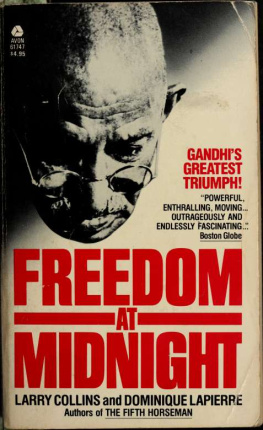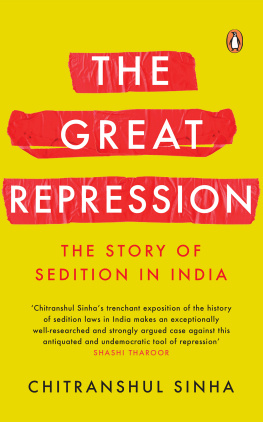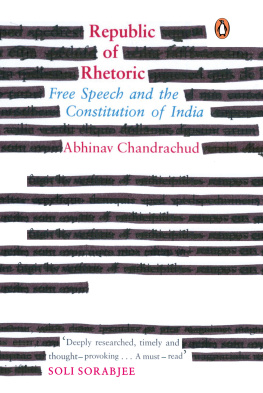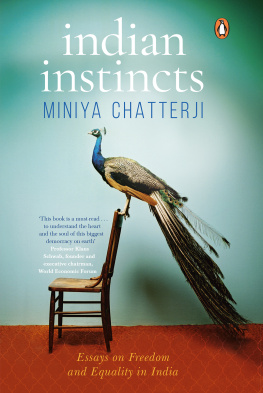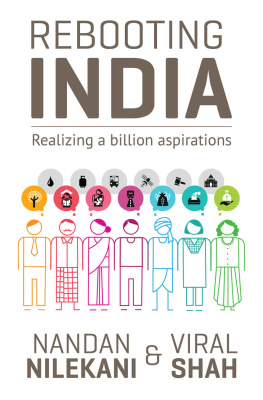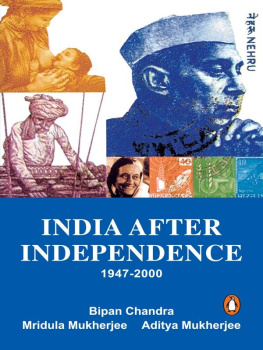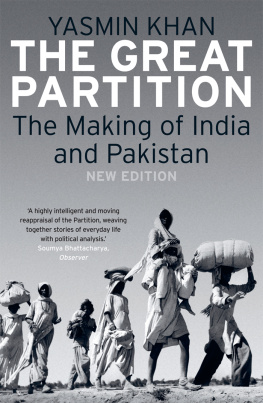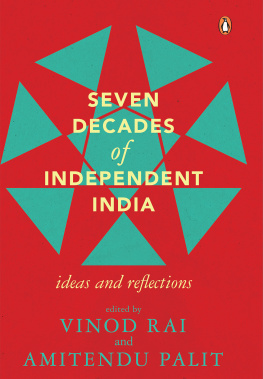"The responsibility for governing India has been placed by the inscrutable design of providence upon the shoulders of the British race."
Rudyard Kipling
"The loss of India would be final and fatal to us. It could not fail to be part of a process that would reduce us to the scale of a minor power."
Winston Churchill to the House of Commons, February 1931
"Long years ago we made a tryst with destiny, and now the time comes when we shall redeem our pledge.... At the stroke of the midnight hour, while the world sleeps, India will awake to life and freedom. A moment comes, which comes but rarely in history, when we step out from the old to the new, when" an age ends, and when the soul of a nation, long suppressed, finds utterance..."
Jawaharlal Nehru,
to the Indian Constituent Assembly, New Delhi, August 14, 1947
PROLOGUE
The rude arch of yellow basalt thrusts its haughty form into the city's skyline just above a little promontory lapped by the waters of the Bay of Bombay. The Bay's gentle waves barely stir the sullen green sludge of debris and garbage that encircles the concrete apron sloping down from the arch to the water's edge. A strange world mingles there in the shadows cast by its soaring span: snake charmers and fortunetellers, beggars and tourists, disheveled hippies lost in a torpor of sloth and drug, the destitute and dying of a cluttered metropolis. Barely a head is raised to contemplate the inscription, still clearly legible, stretched along the summit: "Erected to commemorate the landing in India of their imperial majesties, George V and Queen Mary on the second of December MCMXI."
Yet, once, that vaulting Gateway of India was the Arch of Triumph of the greatest empire the world has ever known, that vast British realm on which the sun never set. To generations of Englishmen, its massive form was the first glimpse, caught from a steamer's deck, of the storied shores for which they had abandoned their Midlands villages and Scottish hills. Soldiers and adventurers, businessmen and administrators, they had passed through its portals, come to keep the Pax Britannica in the Empire's proudest possession, to exploit a conquered continent, to take up the white man's burden with the unshakable conviction that theirs was a race born to rule, and their empire an entity destined to endure.
All that seems distant now. Today, the Gateway of India is just another pile of stone, at one with Nineveh and Tyre, a forgotten monument to an era that ended in its shadows barely a quarter of a century ago.
"A RACE DESTINED TO GOVERN AND SUBDUE"
London, New Year's Day, 1947
It was the winter of a great nation's discontent. An air of melancholia hung like a chill fog over London. Rarely, if ever, had Britain's capital ushered in a New Year in a mood so bleak, so morose. Hardly a home in the city that festive morning could furnish enough hot water to allow a man to shave or a woman to cover the bottom of a wash-basin. Almost without exception, Londoners had greeted the New Year in bedrooms so cold their breath had drifted on the air like puffs of smoke. Precious few of them had greeted it with a hangover. Whiskey, in the places where it had been available the night before New Year's Eve celebrations, had cost eight poundsthirty-five dollarsa bottle.
The streets were almost deserted. The passers-by hurrying down their sidewalks were grim, joyless creatures, threadbare in old uniforms or clothes badly worn after eight years of mend and make-do. What few cars there were darted about like fugitive phantoms guiltily consuming Britain's rare and rationed gasoline. A special stench, the odor of postwar London, permeated the streets. It was the smell of charred ruins drifting up like an autumn mist from thousands of bombed-out buildings.
And yet, that sad, joyless city was the capital of a conquering nation. Only seventeen months before, the British had emerged victorious from mankind's most terrible conflict. Their achievements, their courage in adversity
then, had inspired an admiration such as the world had never before accorded them.
The cost of their victory, however, had almost vanquished the indomitable British. Britain's industry was crippled, her exchequer bankrupt, her once haughty pound sterling surviving only by injections of American and Canadian dollars, her Treasury unable to pay her staggering war debt. Foundries and factories were closing everywhere. Over two million Englishmen were unemployed. Coal production was lower than it had been a decade earlier and, as a result, every day some part of England was without electric power for hours.
For Londoners, the New Year beginning would be the eighth consecutive year they had lived under severe rationing of almost every product they consumed: food, fuel, drinks, energy, shoes, clothing. "Starve and shiver," had become the byword of the people who, proclaiming "V for Victory" and "Thumbs Up," had defeated Hitler.
Only one family in fifteen had been able to find and afford a Christmas turkey for the holiday season just past. Many a child's stocking had been empty Christmas night. The treasury had placed a 100 percent sales tax on toys. And the word most frequently scrawled on the windows of London's shops was "No""No potatoes," "No logs," "No coal," "No cigarettes," "No meat." Indeed, the reality confronting England that New Year's morning had been captured in one cruel sentence by her greatest economist. "We are a poor nation," John Maynard Keynes had told his countrymen, "and we must learn to live accordingly."
Yet, if Londoners did not have enough hot water that morning to make a cup of tea with which to welcome the New Year, they had something else. They could, because they were English, lay claim to a blue-and-gold document which would guarantee their entry to almost a quarter of the earth's surface, a British passport. No other people in the world enjoyed such a privilege. The most extraordinary assemblage of territories, protectorates, associated states, colonies and possessions which were the British Empire remained on this New Year's Day, 1947, largely intact. The lives of 560 million peopleTamils and Chinese, Bushmen and Hottentots, pre-Dravidian aborigines and Melanesians, Australians and Canadianswere still influenced by the actions of those Englishmen shivering in their unheated London homes. They could, that morning, claim
domain over almost 300 pieces of the earth's real estate from entities as small and as unknown as Bird Island, Bramble Cay and Wreck Reef to great, populous stretches of Africa and Asia. Britain's proudest boast was still true: every time Big Ben's chimes tolled out over the ruins of Central London that New Year's Day, somewhere in the British Empire, at sunrise, a Union Jack was riding up a flagstaff.
No Caesar or Charlemagne had ever presided over a comparable realm. For three centuries its scarlet stains spreading over the maps of the world had prompted the dreamings of England's schoolboys, the avarice of her merchants, the ambitions of her adventurers. Its raw materials had fueled the factories of the Industrial Revolution, and its territories furnished a protected market for their goods. "Heavy with gold, black with industrial soot, red with the blood of conquest," the Empire had made in its time a little island kingdom of fewer than fifty million people the most powerful nation on earth, and London the capital of the world.

